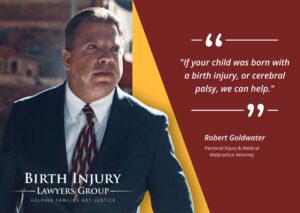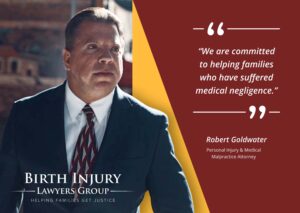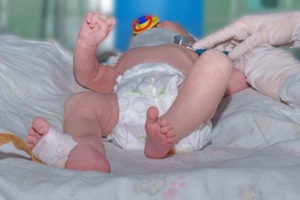
Hypoxic ischemic encephalopathy (HIE) represents a kind of brain injury that occurs due to a lack of blood flow or oxygen to the brain. This condition can occur during childbirth and may result in serious health consequences for your child.
After a diagnosis, many parents wonder: does HIE always cause brain damage? HIE is a kind of brain disorder, so it always comes with some degree of damage. However, the severity of the effects can vary.
Does HIE Mean Your Child Has Brain Damage?
According to UCSF Benioff Children’s Hospitals, HIE represents a type of brain dysfunction. We can learn more about this condition by breaking down each part of the ailment.
The term hypoxia means that your child did not receive enough oxygen. Ischemia means that your child did not have enough blood flow for a period of time. And doctors use the term encephalopathy to refer to any brain disorder. Thus, it is a brain disorder caused by a lack of oxygen and blood to the brain.
HIE can cause damage to the brain, leading to other conditions and lifelong healthcare concerns for children.
"If your child was born with a birth injury, or cerebral palsy, we can help."
Can Babies With HIE Recover?
HIE can result in serious health issues for newborns. However, prompt treatment can mitigate the severity of the condition, allowing for some degree of recovery. Infants generally recover better if they have mild or moderate HIE.
The prospect of recovery varies based on how quickly doctors begin treatment, as well. Depending on factors surrounding your child’s health, doctors may treat your baby with:
Brain Cooling
According to the National Library of Medicine, brain cooling represents one of the best treatments for infants displaying signs of HIE. Doctors cool your infant for around three days with this treatment.
Cooling the brain even a few degrees can minimize the severity of a brain injury. Doctors cool babies by wrapping them in a cooling blanket and giving them specialized medicines; medical professionals monitor your child throughout the treatment.
After three days, medical professionals bring the baby’s body temperature back up to normal, monitoring their health the entire time.
Additional Therapies
Cooling therapy remains one of the most recommended treatments for HIE. However, doctors may supplement the treatment with other therapies. For example, they may provide seizure medications and mechanical ventilation if necessary.
These therapies can help reduce the damage caused by HIE.
Can Babies Adapt to the Damage Caused by HIE?
Immediate treatment can mitigate the effects of HIE on your child. However, many children still have symptoms from the brain injury as they grow and develop. Medical professionals can set up long-term treatment plans to assist your family.
Your medical team may suggest physical, medical, and occupational therapies. In some cases, children who experience HIE may require assistive devices, like walkers or wheelchairs. These tools can help them as they grow older.
"We know first-hand what you are going through."
What Is Considered Mild HIE?
Does HIE always cause brain damage? In some cases, babies who experience mild or minor HIE recover without 24 hours and experience no long-term health issues. Infants with mild HIE often display:
- Irritability
- Increased muscle tone
- Excessive crying
- Poor feeding
Doctors monitor these symptoms and provide treatments. Addressing mild HIE quickly often allows your child to recover without further issues.
Infants with moderate HIE may also make full recoveries. However, these children are more likely to experience mild disabilities due to insufficient blood flow to their brains.
Babies who experience severe HIE often have permanent disabilities that impact them for the rest of their lives.
"Our Birth Injury Lawyers have recovered over $750+ Million on behalf of our clients."
What Causes HIE In Infants?
HIE occurs for various reasons before, during, and after labor. In some cases, a mother’s health conditions can contribute to HIE. For example, maternal diabetes and preeclampsia can both contribute to instances of HIE.
Sometimes, issues during labor lead to HIE. Medical professionals must monitor the vital signs of the baby and mother during childbirth, moving quickly if they notice problems caused by:
- The umbilical cord
- A rupture of the uterus
- Bleeding from the placenta
- Low blood pressure
- Abnormal fetal position
These problems may occur without warning. However, medical professionals may prevent HIE in some cases by immediately ordering an emergency C-section.
Can You Secure Compensation For Brain Damage From HIE?
While HIE does not always result in significant brain damage, it can impact your child’s health throughout their life. In addition, your family may face high expenses as you care for your child.
While you cannot always secure compensation after an HIE diagnosis, you may have a chance to legally pursue damages in cases involving medical malpractice.
Medical malpractice occurs when healthcare workers fail to provide appropriate care. In these cases, you may receive funds to cover:
- Your child’s medical expenses
- Your child’s pain and suffering
- Your lost wages at work
- Costs for assistive devices
You can learn more about this option with a birth injury lawyer. A legal team may advise you to file an insurance claim against the medical professional who caused the birth injury or the medical facility where the injury occurred.
Your family may also have the option to file a lawsuit, depending upon the facts of your situation.
Contact A Birth Injury Lawyer About HIE And Brain Damage
HIE does not always cause brain damage. In some minor cases, infants with HIE fully recover. However, many children end up facing lifelong repercussions from HIE—and some don’t survive. You may have a legal claim if a doctor caused your child’s HIE.
Find out more about your options with a birth injury lawyer by calling or completing our online contact form.
"We are committed to helping families who have suffered medical negligence."


